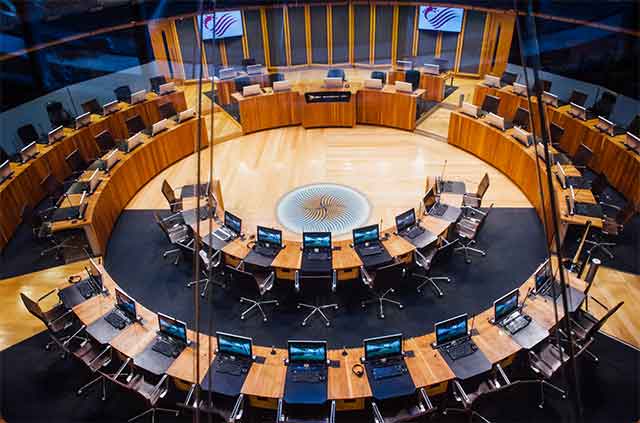A funding gap of tens of millions is thwarting efforts to restore opencast mines – and public authorities in Wales must clamp down on corporate greed, a committee heard.
The Senedd’s climate change committee began taking evidence for an inquiry on restoration of opencast mines amid concerns about Ffos-y-fran in Merthyr Tydfil.
Carl Banton, operations director at the Coal Authority, said the public body tries to broker the best restoration possible but the primary problem is a lack of funding.
He told the committee that £50m is available for restoration work at Ffos-y-fran, which closed in November, but it will cost anywhere from £75m to £125m – “a big, big gap in funding”.
Mr Banton said East Pit and Margam regeneration plans suffered from a similar shortfall.
‘Missing money’
“One of the big issues now is the amount of water that is in those voids,” he said, warning that pumping the water out is a “huge undertaking” potentially costing tens of millions itself.
Mr Banton explained that councils are the primary authority for regulation of surface mines through planning and the Coal Authority has a role in terms of licensing mining operations.
Raising 2016 best practice guidance on restoring surface coal mines, Mr Banton said: “The idea of this was to try to prevent the situation we are currently in.”
Mr Banton warned that the amounts held by councils in escrow in case a company goes into insolvency are “nowhere near sufficient” for restoration plans.
The operations director said the Coal Authority offered guidance to Merthyr Tydfil council around escrow in 2016 “but they chose not to go down that route”.
‘Conflict’
Mark Drakeford suggested the UK Government’s remit for the Coal Authority – to maximise the extraction of coal – is in stark conflict with Wales’ policy of minimising use of fossil fuels.
Mr Banton told the former first minister a planned review of the remit has not taken place.
On Ffos-y-fran, he said the Coal Authority wrote to the Welsh Government in October to raise the risks in terms of public safety and the need to act sooner rather than later.
Prof Drakeford raised concerns about an inspection which found the company was mining beyond the Ffos-y-fran site boundary without planning permission.
Mr Banton said the Coal Authority reinspected in August, finding the company was still mining outside the permitted area, and began enforcement action in September.
‘Corporate greed’
Delyth Jewell, for Plaid Cymru, raised concerns about Merthyr Tydfil council’s suggestion that the void filled with contaminated water could form part of a restored site.
Mr Banton said a hydrogeological assessment will be required to ensure the water is safe.
Daniel Therkelsen, from the Coal Action Network, attributed a lack of restoration in Wales to legislative weakness and corporate greed.
The campaigner said Celtic Energy’s sites have been left in a dire state, with a judge finding the actions of the company were reprehensible but not illegal.
Mr Therkelsen said the Fros-y-fran site operator, Merthyr (South Wales) Limited, has paid out nearly £50m in dividends and shares since 2016.
Marcus Bailie, an Extinction Rebellion Cymru activist, similarly raised alarm about private profit coming at the expense of public and planetary good.
‘Poorly restored’
Pointing to East Pit and Margam as examples of poorly restored sites, Mr Therkelsen said people nearby continue to call for restoration to “some sort of semblance of what it was”.
Friends of the Earth Cymru director Haf Elgar said campaigners have been raising concerns about Ffos-y-fran for years as she urged the council and Welsh Government to intervene.
She said: “It’s been quite difficult to get information out of the local authority – whether that’s about ensuring local communities are consulted or basic planning documents.”
Mr Therkelsen said responses have been protracted, accusing the council of “blocking” public scrutiny on one hand while holding weekly meetings with the operator on the other.
He warned that the 14 to 16 months of illegal mining at Ffos-y-fran saw around 600,000 tonnes of coal extracted, leading to an estimated 428 climate-related deaths.
‘No consequences’
He said: “Nothing happens to them – there are no consequences. Not one penny of the company’s profits have been touched despite mining illegally for over a year.”
David Kilner, campaign coordinator at Climate Cymru, said restoration plans for Fros-y-fran will likely be deeply insufficient considering the funding shortfall.
Ms Elgar raised concerns about the risk of plans for Bedwas tip “opening the door” to another industry of extracting coal in exchange for a promise of restoration.
Llŷr Gruffydd, who chairs the committee, criticised Merthyr Tydfil council which refused to give in-person evidence on April 24, submitting two pages of written evidence instead.
Merthyr (South Wales) Ltd has been invited to give evidence to the committee on May 9.

